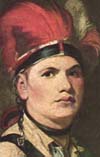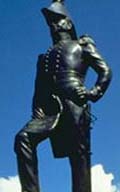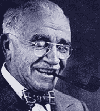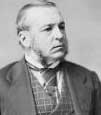Civic
Holiday
First Mon. in August
An
Ode to Civic Holiday
[Note: The following article is available for
free. E-mail me.]
When holidays get together for a party, Civic
can be found standing in the corner playing air-guitar.
Civic
Holiday celebrates no noble event, marks no history-changing
tragedy, remembers no birth or death of significance.
It
is not meant to make us feel romantic, holy, inspired or thankful.
It
is, in essence, a Canadian version of the eminently practical
British "Bank Holiday," except without the Carol
Reed film. (Bank
Holiday,1938.)
But,
while Civic Holiday may lack its own movies, songs or seasonal
line of merchandising, it has one quality we can all appreciate.
It's
there because we wanted it.
Summer
in Toronto can get hot enough to make a mortician sweat, so
it's not surprising that as far back as 1869 Toronto City
Council was toying with the idea of a mid-summer "day
of recreation." It took another six years, but in 1875
this day became Civic Holiday.
Even
for English Canadians, however, the name seemed pretty dull.
It
took close to a hundred years to do something about it, but
in 1968, Toronto grasped the bull firmly by the tail and renamed
its Civic Holiday to "Simcoe Day" after John Graves
Simcoe.
Following
twelve years of deliberation, Burlington chimed in with "Joseph
Brant Day" (1980), in honour of the Mohawk Freemason,
Chief
Joseph Brant.
Throwing caution to the wind, Brantford took only two years
to renamed their day "Founders' Day" (1982), and
in another two years Oshawa was celebrating "McLaughlin
Day" (1984), to honour The Man Who Brought General Motors
to Oshawa.
Perhaps
spooked by our collective rashness, we pretty much left Civic
Holiday alone for 12 years. Then, in 1996, perhaps in a jubilant
mood from the narrowly defeated sovereignty referendum of
the year before, Ottawa declared its Civic Holiday would henceforth
be known as "Colonel By Day" after the builder of
the Rideau Canal and the founder of "Bytown", the
early version of Ottawa. (Rumour has it he had help in both
projects.)
More
followed, but perhaps the pool of historic personages was
growing a bit shallow. In 1998 Sarnia created "Alexander
McKenzie Day," after the man know as Our Second Prime
Minister, and a year later the Town of Cobourg began celebrating
"James Cockburn Day" in honour of a relatively harmless
Father of Confederation.
Not
everyone, however, is pleased with this proliferation of names.
Some, like Toby
Barrett, MPP for Haldimand-Norfolk-Brant, would much prefer
the Civic Holiday to be officially known as "Simcoe Day"
all across the province. There is even a private Member's
Bill (1999) proposing that the Municipal Act be amended to
read:
If
the head of the council of a local municipality proclaims
the first Monday in August in any years as a civic holiday,
the holiday shall be known as Simcoe Day.
The
wisdom of such a bill, however, is questionable.
John
Graves Simcoe is fine for some, but not everyone in Ontario
holds him in such high regard. Should it pass, what what was
once a pleasant, mid-summer holiday could become a day of
rallies and demonstrations escalating into CBC specials.
The
truth is, Civic Holiday is not a holiday for greatness; it's
a holiday for the rest of us. It's a special day that makes
no excessive demands. There isn't even a card to buy.
It
asks for only two things: a cottage and a six-pack.
Now
that's Canadian.
Happy
Civic Holiday everyone.
Christopher
Simpson
References
for above article:
Return
to top
Timeline.
A history of the August
Civic Holiday, from GlobalSeek.net.
-
1869
Toronto
City Council originated a midsummer holiday for a "day
of recreation".
-
1871
A
Bank Holiday was established by the House of Commons in
England. Sir John Lubbock declared that Toronto in Canada
had found an August holiday "advisable and satisfactory".
-
1875
Perhaps
after the precedent set by Sir John Lubbock, Toronto City
Council fixed the first Monday in August as a Civic Holiday.
-
1968
Toronto
City Council officially called the civic holiday "Simcoe
Day" after John Graves Simcoe, who was appointed
the first lieutenant governor of Upper Canada on September
12th, 1791. He convened the first legislative assembly
and established York (now Toronto) as the capital of the
province.
-
1980
Burlington
celebrates the holiday as "Joseph Brant Day".
Joseph Brant was a Mohawk Chief who became known for his
treaty negotiations and loyalty to the British.
-
1982
The
City of Brantford adopted a policy that stated that the
civic holiday be named "Founders' Day". Each
year, the Brantford Heritage Committee submits a report
to City Council with the name or organization that is
to be recognized on that day.
-
1983
Oshawa
City Council passed a resolution to recognize the holiday
as "McLaughlin Day" in honour of the late Colonel
R. S. McLaughlin, who brought General Motors to Oshawa.
-
1996
The
City of Ottawa passed a by-law proclaiming the Civic Holiday
as Colonel By Day. John By (1779-1836) was a British Lieutenant-Colonel
and military engineer. His most noteworthy achievement
was the building of the Rideau Canal and Bytown (now Ottawa)
was named after him.
-
1998
Sarnia
City Council passed a resolution declaring the holiday
Alexander McKenzie Day. Alexander Mackenzie was the second
Canadian Prime Minister from 1873-1878.
-
1999
The
Town of Cobourg proclaimed the holiday as James Cockburn
Day". James Cockburn was a father of Confederation
and represented the riding of Northumberland West in the
Legislative Assembly of Canada, 1861-67.
* The
Municipal Act, R.S.O. 1990, Chap. M.45, s. 214(8) provides
that municipal councils can make by-laws proclaiming a civic
holiday and requiring the closing of shops on such a day.
** The
Interpretation Act, R.S.O. 1990, Chap. I.11, s.29 (1) does
not include the August "Civic Holiday" in its designation
of official public holidays that apply to everyone; nor do
the Retail Business Holidays Act or the Employment Standards
Act include it in their definition sections. However, the
holiday is mentioned in a number of Ontario statutes within
the context of giving time off for specific types of employees
or of regulating business hours, etc.
(From
GlobalSeek.net)
Return
to top
 Joseph
Brant Joseph
Brant
1742 - Nov. 2, 1807.
1742
- November 2, 1807
The Mohawk Thayendanegea, also known as Joseph Brant, served
as Principle Chief of the Six Nations Indians, a Christian
missionary of the Anglican church, and a British military
officer during the U.S. War of Independence.
Brant
was born in 1742 near what is now Akron, Ohio and given
the Mohawk name of Thayendanegea, meaning "he places
two bets." He inherited the status of Mohawk Chief
from his father.
A student
of Latin and Greek, he helped translate Mark's Gospel into
Mohawk. With the help of the Iroquois, he fought for the
British against the American colonists. After the war he
lead his people to what is now Ontario, Canada. Joseph Brant
died in Burlington, Upper Canada on November 2, 1807.
The
story of his rescuing a Continental soldier may be apocryphal.
Initiated:
1776
Hiram's Cliftonian Lodge No. 47 Raised: April 26, 1776
Lodge No 417 at the Falcons, Leicester Fields, London
Founding Master: 1798
Brantford Lodge No. 31 - Affiliated: Barton Lodge, now No.
6, Hamilton, Ontario
(Taken
from: Chief
Joseph Brant from the Grand
Lodge of British Columbia and Yukon.)
For
more information:
Return
to top
 Colonel
John By Colonel
John By
(1779-1836)
When
the Canadian colony needed an arms supply route in case
of U.S. invasion, London sent Lt.-Col. John By of the Royal
Engineers in 1826. He was tasked with forging a canal from
Bytown (now Ottawa) to Kingston through rock, marshes and
forests – a daunting challenge given the elementary
technology of the era. Yet nothing could thwart British
ingenuity and the physical endurance of 2,000 mostly Irish
immigrant workers.With shovels, pick axes and gun powder,
these hardy souls fought disease, the elements and nature’s
massive obstacles. In only five summer working seasons,
they dug a 200-km channel with 47 locks. The most impressive
of these serves to bridge Parliament Hill and the Chateau
Laurier Hotel. It’s located next to the popular Bytown
Museum, Ottawa’s tribute to the man who designed a
waterway symbolizing heroic human achievement.
(Taken
from Path
of Heroes, a Canadian Government site. Its home page is
here.)
For
more information:
Engineering
Defence of a Nation: Colonel By's building of
the Rideau Canal from the Government of Canada's Digital
Collections.
Biography
& Photos: A site created by Sir
Wilfred Laurier Secondary School. Complete with photos.
Engineering
the Canal: Mostly notable for its spectacular
photo
of the old Rideau. Site created by the Bytown
Museum.
Return
to top
 Robert
McLaughlin Robert
McLaughlin
In 1876,
Robert McLaughlin, who had already established a carriage
works business, relocated to Oshawa, drawn by its flourishing
rail and harbour facilities. With the help of a $50,000
interest-free loan from the Town of Oshawa, the McLaughlin
Carriage Company quickly developed into the largest carriage
works in the British Empire.
With
the automobile fast gaining popularity, the McLaughlins
decided to enter the business by contracting with the Buick
Motor Car Company of Michigan for use of the Buick engine
in the McLaughlin car. Automobile production began in 1907
when 198 McLaughlin automobiles were built.
In 1915,
the McLaughlins acquired the rights to build Chevrolets
and the Chevrolet Motor Car Company of Canada was formed.
This resulted in the sale of the carriage business. Three
years later, the McLaughlin Motor Car Company and Chevrolet
Motor Car Company of Canada were merged to create General
Motors of Canada, Limited, a wholly-owned unit of the General
Motors Corporation, with Robert Samuel McLaughlin as President.
(Taken
from A
Brief History of the City of Oshawa developed by Oshawa's
official Web site.)
For
More Information:
My
80 Years on Wheels: By R. S. McLaughlin as told
to Eric Hutton. An official article on McLaughlin on the official
GM
site. Also includes a History
of GM in Canada, and GM
Canada's Historic Timeline.
The
McLaughlin Motor Car Company: History of the
car company created by McLaughlin. From About.com's Vintage
Cars section.
Robert
McLaughlin Gallery: Located
at 72 Queen Street, Civic Centre, Oshawa. When the gallery's
expanded building was opened in 1987, Isabel McLaughlin, granddaughter
of Robert McLaughlin, donated a collection of Canadian, international
and native art.
General
Motors of Canada ... The Axe Handle Company?:
An interesting account of the history of General Motors in
Canada from Mysteries
of Canada.
Return
to top
 James
Cockburn James
Cockburn
(Feb. 13, 1819 - Aug. 14, 1883)*
Like
several other fathers of confederation, James Cockburn came
from the British Isles. He was born at Berwick, England,
February 13, 1819.
James
was thirteen when his family migrated to Canada. They settled
in Toronto and James received his education in the recently-founded
Upper Canada College. He was a full-fledged lawyer at twenty-seven
and set up his practice in the lakeside town of Cobourg,
one of the most progressive centres in the province.
In 1861
he was elected to the legislative assembly by his home county,
Northumberland. After three years' experience in parliament,
he became solicitor general and like all other coalition
ministers became a delegate to the conference at Quebec.
The
delegates from the Maritime Provinces were taken on an extended
tour of the Canadas, as far west as Niagara. Like other
junior ministers, Cockburn had not much to say at Quebec.
But Cobourg was one of the points on the tour and Cockburn
made it the occasion for a pleasant supper meeting for the
delegates, their wives and daughters.
When
the federal parliament was organized, Cockburn was chosen
unanimously to be the first speaker of the house. In a parliament
where opinions were so sharply divided, this was no small
chore. For seven years, Cockburn, a man of courtesy, tact
and firmness, set a high standard for the important office
of speaker of the house.
He died
in Ottawa, August 14, 1883.
Quoted
from James
Cockburn on the Hastings
and Prince Edward District School Board (Belleville).
For More
Information
James
Cockburn: Brief bio from the National
Library of Canada.
Return
to top
|
